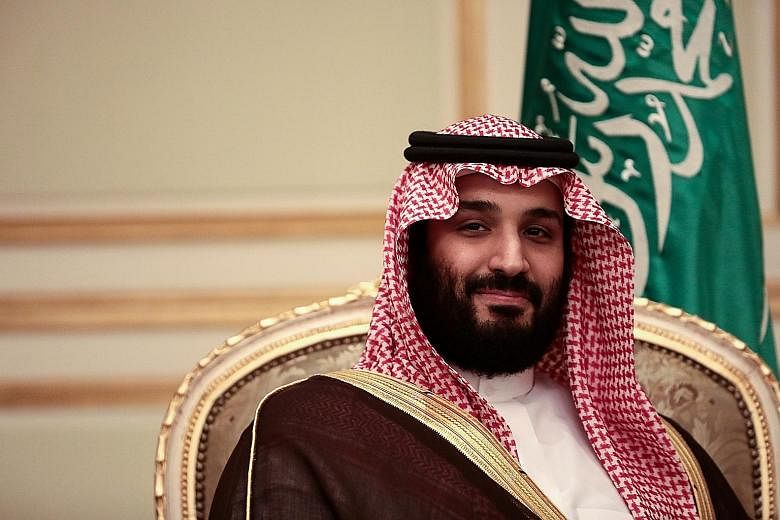At the age of 32, not many people would have already earned their place in the history of their countries. Saudi Arabia's Crown Prince Mohammad bin Salman (or MBS as he is known) is an exception.
For not only did he push aside an entire generation of much older royal princes who seemed assured of ascending the throne, but he has also transformed his nation; the historic decision to allow Saudi women to drive is attributed to him, as are countless economic reforms now sweeping the kingdom with the speed of a proverbial desert storm.
Like all radical reformers, MBS' actions attract both praise and criticism. Some regard him as Saudi Arabia's greatest hope, while others dismiss the new crown prince as just an inexperienced youngster in a hurry.
Be that as it may, there is no question that the man who may soon also become the Arab world's youngest head of state will determine not only the future of his country but also, potentially, that of the entire region.
When Prince Mohammad was born, there was nothing to suggest that he would ever rise above the rank of a secondary Saudi royal, destined to be paid a stipend to remain quiet and cooperative, and expected to divide his time between granting audiences to tribal leaders and discreet shopping expeditions to London, Paris or New York.
For while MBS was born to Salman - one of Saudi Arabia's famed "Sudayri Seven", the sons of Abdulaziz, the kingdom's founder - and could expect to see his father become king one day, the succession order was already established, and MBS was not on the list. The throne was supposed to go to a completely different Mohammad, the son of Prince Nayef, another scion of the Sudayri Seven.
But the unthinkable happened; by 2015, MBS was already deputy crown prince to the older Mohammad. And in a move which has astonished even seasoned Saudi observers, his father King Salman appointed MBS next in line to the throne in June this year.
The move not only broke with precedent but also riled the United States, which supported the older Mohammad, widely regarded in Western capitals as an efficient administrator and the architect of the desert kingdom's successful anti-terrorism strategy.
And MBS, who clearly enjoys his father's total support, has wasted no time tearing up many of his kingdom's traditional ways. He is behind the so-called "Vision 2030", a sweeping pledge to develop Saudi Arabia as a centre for business, trade and tourism.
He is also planning to sell a stake in Saudi Aramco, the world's largest oil company.
The strategy is clearly right; the kingdom needs to move away from its oil-based economy. But, as critics point out, it is not obvious that the Crown Prince, who has surrounded himself with Western management consultants, understands that the key to economic reform is a deeper social reform. Without overhauling the education system and harnessing the potential of the female half of the population, few of these diversification efforts can succeed.
The prince is also suffering from the traditional problem facing all his country's previous reformers: when oil prices are high nobody wants change, but when oil prices are low and changes are needed, there are no resources to implement reform.
MBS has already had to withdraw plans to cut benefits for public sector employees, and statistics just published indicate that the Saudi economy had shrunk by 1.8 per cent in the second quarter this year, the second such successive contraction.
MBS has attracted even more criticism with his foreign policy choices. He is assumed to be behind Saudi Arabia's decision to get involved in the war in Yemen, a quagmire with no end. He is also suspected of inspiring his father's decision to impose an embargo on Qatar, in an effort to reassert Saudi Arabia's primacy in the region.
Still, much of this criticism obscures the fact that the young prince appears to be genuinely popular in a country in which over half of the population is under the age of 25, yet all of its monarchs had come to the throne in their dotage, and often infirm.
The decision to allow women to drive may seem a small matter, but it is a huge development in a nation where, until fairly recently, women were not even required to be registered in identity papers, as they were merely considered the property of their families.
Oblivious to critics, Salman is determined to see his favourite son succeed him; the current king is rumoured to be preparing his abdication soon, to make sure that he is still around to protect MBS as he accedes to the throne.
And there is little doubt about the Saudi Crown Prince's determination. "I'm young, and most of our citizens are young," he recently reminded Western journalists. "We don't want to waste our lives in this whirlpool that we were in the past 30 years; we want to end this now."

